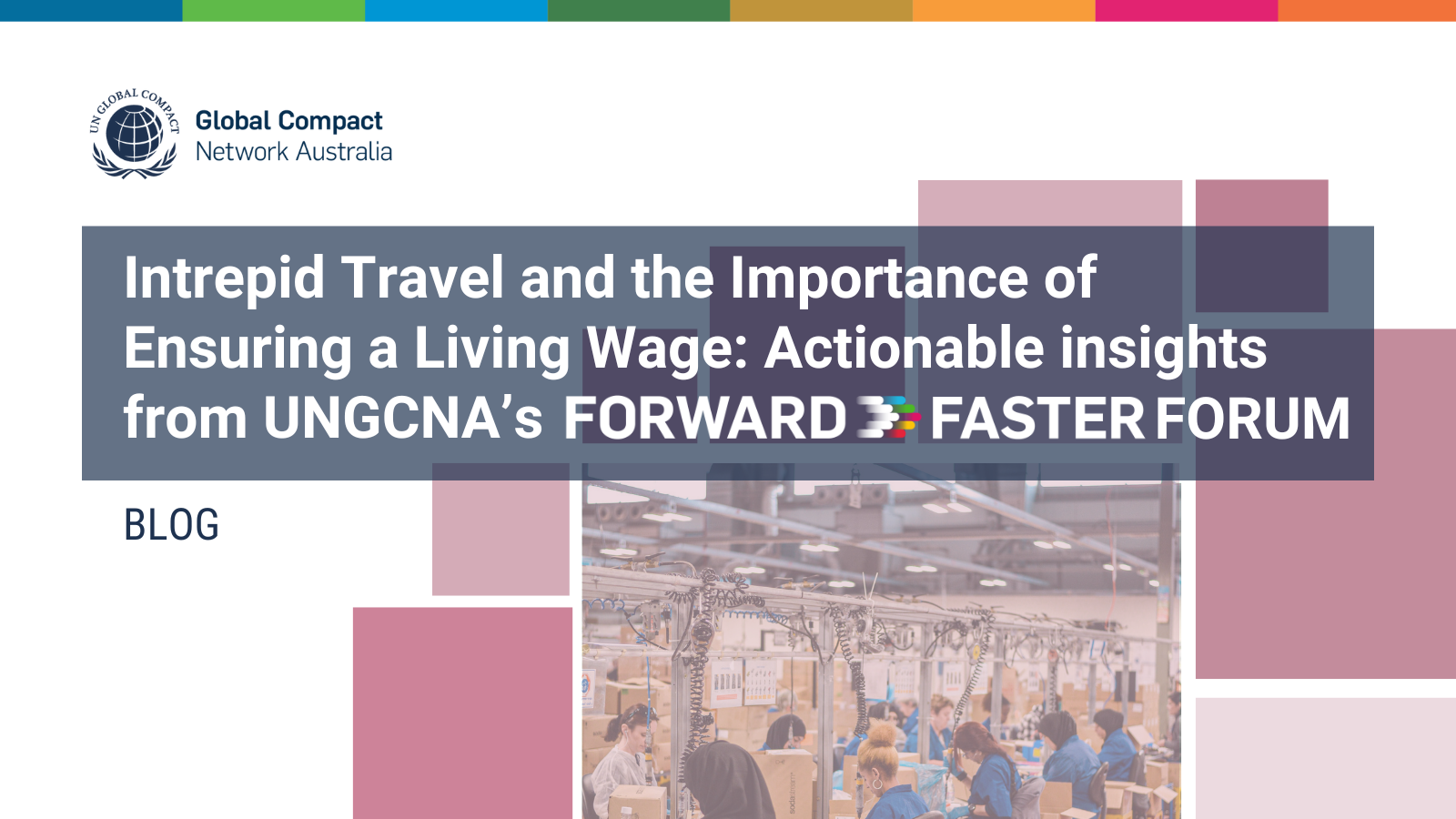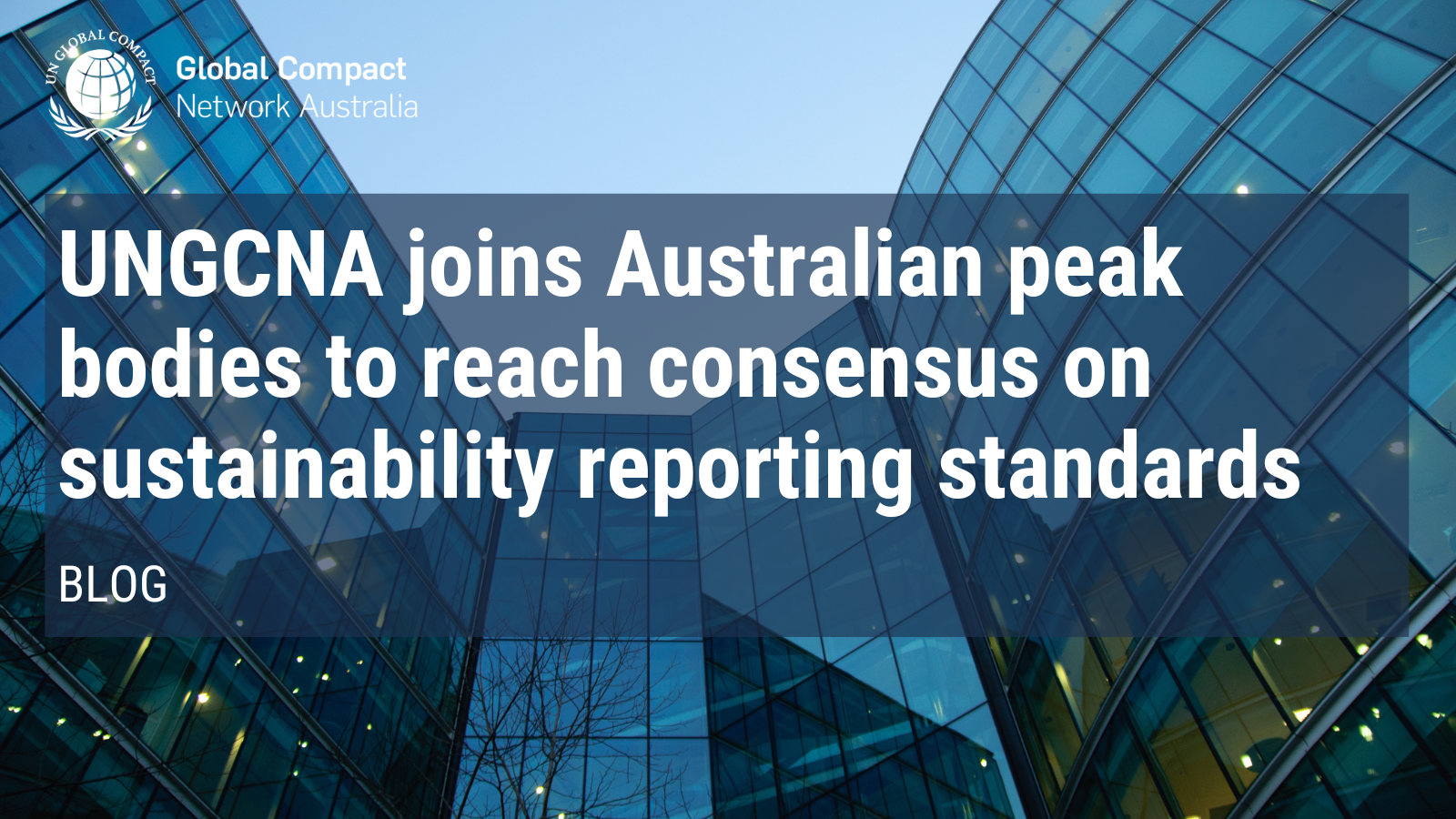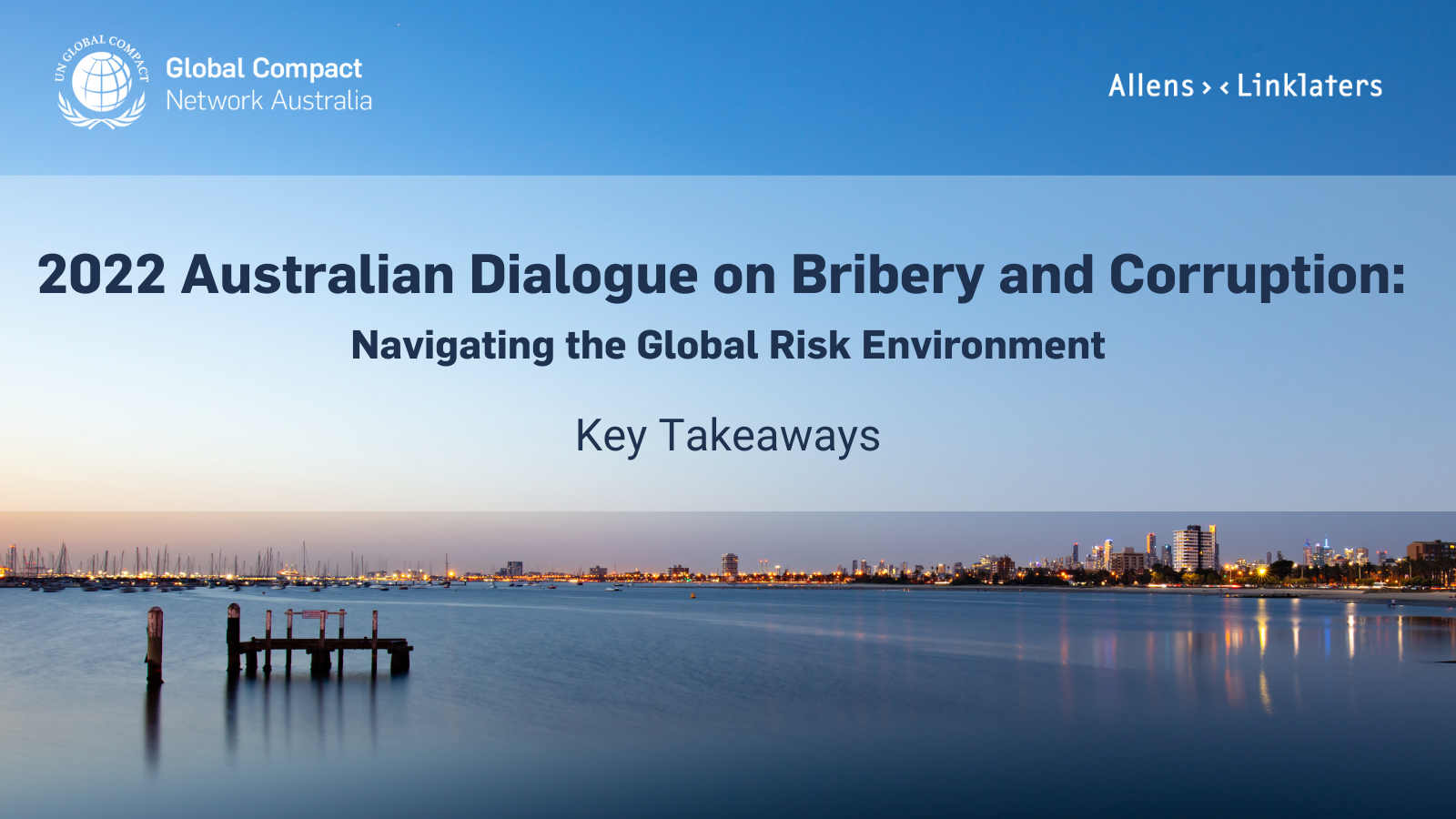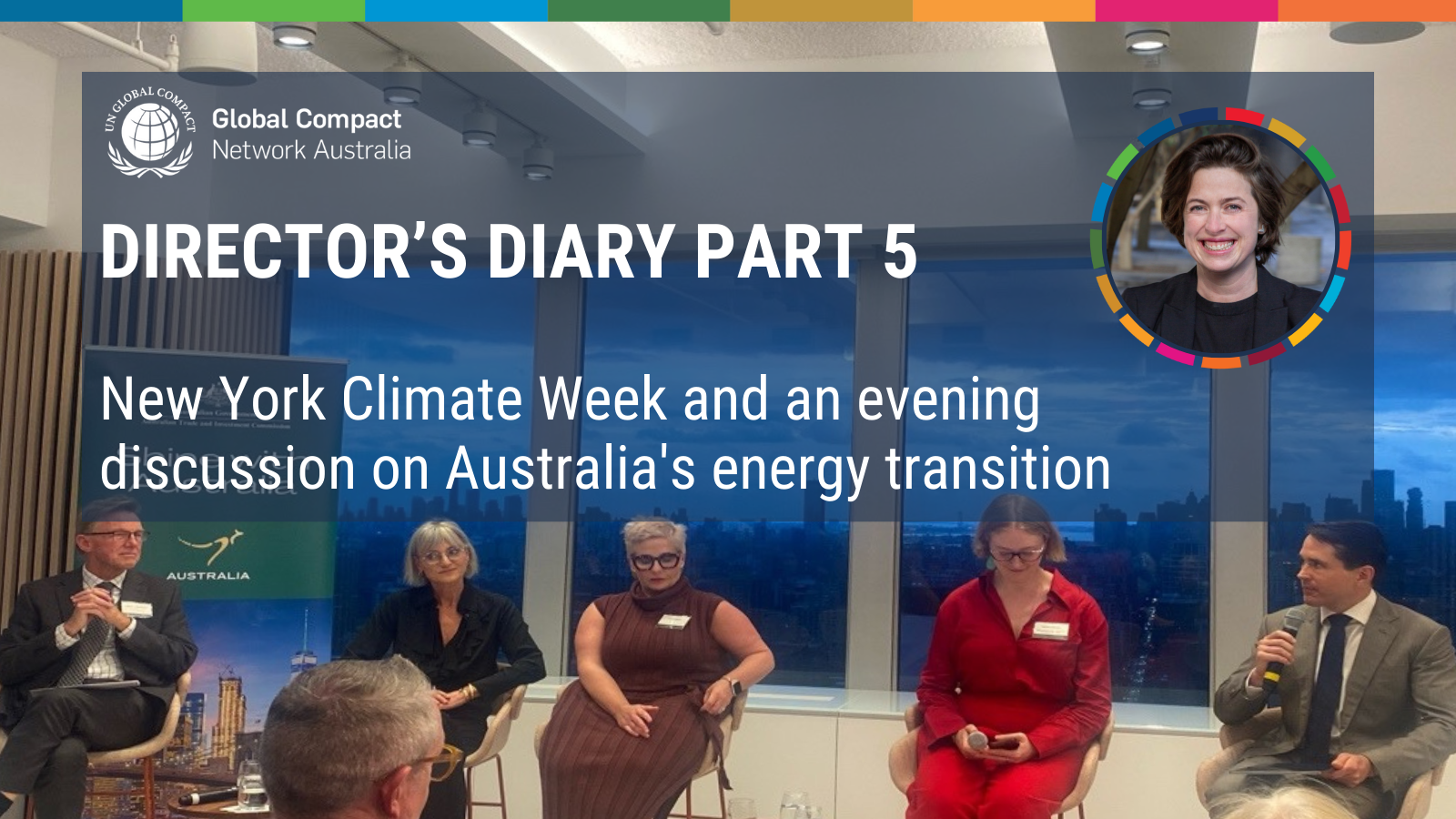
Blogs, Business & Human Rights
BLOG | Intrepid Travel and the Importance of Ensuring a Living Wage: Actionable insights from the UN Global Compact Network Australia’s Forward Faster Forum
UN Global Compact Network Australia | June 26, 2024
Today, over a billion working people worldwide – one third of all workers – are estimated to earn less than they need to afford a decent standard of living. This means that for many of the most vulnerable workers around the world, a job does not provide a way out of the cycle of poverty for them and their families.
The UN Global Compact’s Forward Faster initiative works towards ensuring all workers are paid a living wage, enabling them to meet their and their family’s basic needs. This is essential to us meeting many of the Sustainable Development Goals (SDGs) including:
SDG 1: No Poverty,
SDG 5: Gender Equality,
SDG 8: Decent work and Economic Growth and
SDG 10: Reduced Inequalities.
The UN Global Compact Network Australia (UNGCNA)’s Forward Faster Forum, held before the National Banksia Sustainability Awards in Melbourne, centred on the UN Global Compact’s Forward Faster initiative. The event brought together business leaders and change-makers to consider the five action areas of the initiative, living wage, gender equality, climate action, finance and investment, and water resilience.
UNGCNA Forward Faster Forum – Living Wage Fireside Chat Panel
- Robin Mellon, Director, UN Global Compact Network Australia and CEO of Better Sydney
- Sara King, GM, Purpose, Intrepid Travel
How will taking ambitious action on living wage benefit your ?
Put simply, paying a living wage across your value chain reduces inequalities and builds stronger supply chains. This ultimately improves productivity and can enable the following benefits for your company:
- Reduced staff turnover and absenteeism, increased retention and motivation, attracting new talent and increasing staff productivity
- Improved supply chain relationships, performance, resilience and transparency
- New pathways to tackle poverty and reduce inequalities
- Demonstration of a commitment to respecting the human rights of workers.
What is a Living Wage?
A living wage is an income level that enables people to enjoy the standard of living enshrined in ights. The push toward a living wage at the international level is in response to many locally set wages failing to support workers and their families to enjoy this standard of living. While many countries have established a minimum wage, they are not consistently enforced, are not adjusted frequently enough to keep up with inflation or do not apply to all categories of wage earners.
A living wage should be calculated with reference to the which is a wage level that enables a decent standard of living for workers and their family, considering the countries circumstances and calculated for the work performed during the normal hours of work. Successfully realising the living wage Action Targets contributes directly to SDGs 1, 5, 8 and 10.
Living Wage Action
The UN Global Compact’s Forward Faster initiative Living Wage targets are:
Target 1: 100 percent of employees across the organisation earns a living wage by 2030.
Target 2: Establish a joint action plan(s) with contractors, supply chain partners and other key stakeholders to work towards achieving living wages and/or living incomes with measurable and time-bound milestones.
Key Takeaways
Here are three key takeaways from the session:
- Businesses should consider the needs of the workers and their families, and external economic factors when determining a liveable wage
A living wage needs to cover not only what is required to live, but also some level of emergency fund. This is because most legally set minimum wages fail to meet the needs of workers and their families. As stated by Robin Mellon, currently “more than 1 billion people in the world earn less” than a living wage for “essentials”. Therefore, “businesses need to be considering the needs of workers and their families and all of the surrounding factors” when setting wages.
- The issue of the living wage “is a moving target”, Sara King
Solving this issue is extremely complex given that there are a range of award standards companies must consider when calculating wages. Factors such as inflation, and wider changing circumstances render a living wage a “moving target”, said Sara King, therefore solving this issue “takes continued investment”. As noted by Sara King, one of the largest challenges for Intrepid Travel ensuring a living wage for its workers was the consideration of the “different employment laws” in the “32 countries” they operate in.
Addressing this issue can also be quite challenging when considering that getting accurate data can be difficult, which is why Intrepid Travel purchased a data set from Wage Indicator. Intrepid Travel has successfully achieved target 1 as of December 2023, and they have started engaging with suppliers for target 2, however with over 5,000 suppliers globally, there is still some progress to be made. Thus, the volume and changing nature of suppliers adds a further challenge to actualising this goal.
- “Socialising the concept of the living wage in the workplace [is] important”, Sara King
“Showing [the] gaps”, within one’s own business is important as most assume their business “[doesn’t] have gaps” and therefore that action is not necessary. This is evidenced by only four hands being raised by the audience of over 100 attendees when prompted by the question of whether their company had committed to living wage standards. Another strategy employed by Intrepid Travel for legitimising the work required towards the living wage target is the “pilot” method. By starting with a “quick win”, Intrepid Travel had a “story telling piece”, that it could use to secure further investment and a win to ensure those working on the issue had something tangible to take pride in.
The UN Global Compact’s Forward Faster initiative
The UN Global Compact’s Forward Faster initiative was launched on 18 September 2023 and is a 7-year initiative focused on five areas of action where companies can make the biggest, fastest impact across the 17 Sustainable Development Goals by 2030. The five areas of action are:
- Gender equality
- Climate action
- Living wage
- Finance and investment
- Water resilience.
Join the companies taking action
Is your company ready to move Forward Faster and take ambitious action? Right now, only 15% of the SDGs are on track for 2030. We’re calling on all companies to commit to one or more targets today. Join Intrepid Travel and 25 other Australian Companies in the pledge to move Forward Faster. Sign up here.
Contributors:
Malith Fernando, Business and Human Rights Intern, UN Global Compact Network Australia.
Julia Bourke, Senior Coordinator, UN Global Compact Network Australia.



